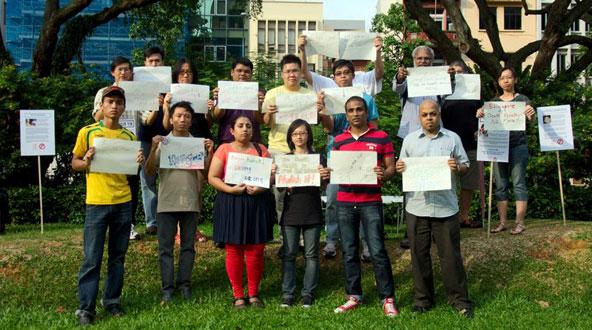
Migrant workers facing capital punishment show need for alternative sentences
Asia
On 21 March 2012, a Singapore court sentenced Indian national Bijukumar Remadevi Nair Gopinathan to the mandatory death penalty for the murder of a Filipina prostitute.
Similar sentences have been imposed in the past year, mainly on low-wage migrant workers. For example, twenty-year-old Malaysian Fabian Adiu Edwin was convicted of murder and sentenced to hang in September last year. That month, a 32-year-old Chinese national was found guilty and given the death sentence for the murder of a taxi driver in 2009.
The World Coalition member organization Think Centre as well as the Singapore Anti-Death Penalty Campaign, We Believe In Second Chances and the Humanitarian Organization For Migration Economics are opposed to the death penalty that has been meted out to these migrants in Singapore.
Opposing the death penaty for any individual and any crime
Although the four organisations do not deny that these individuals have committed a grave crime and should be punished for it, they are opposed to the application of the death penalty on any individual, and for any crime for the following reasons.
The Singapore government has argued that the death penalty is an effective deterrent to serious crimes. However, there is no reliable evidence, locally nor internationally, to show that it is any more effective than other forms of punishments. Based on numerous studies, criminologists agree that the death penalty has no deterrence value.
The causes of violent crime that affect all societies are complex. Crime may be reduced through having better trained and equipped police officers, reducing poverty, improving education and implementing effective rehabilitation programmes. Executing a criminal gives the appearance of strong action being taken when in reality, it does little to address why violent crimes are committed in the first place.
Since the death penalty is irreversible, imposing the ultimate punishment on an individual demands that conclusive, irrefutable evidence is produced to support its use.
The criminal justice system is not infallible and as long as the judiciary has the death penalty, mistakes will be made and innocent people will be killed. Judges, prosecutors, and investigating officers are after all, human.
For example, Taiwan’s Chiang Kuo Ching was wrongfully sentenced to death in 1997. Fresh investigations into the case after he was executed found no evidence of Chiang’s presence at the scene of the crime and established that he was tortured into making a confession. No legal system, however advanced, is immune to miscarriages of justice.
Inadequate legal assistance at any stage of court or investigation proceedings, especially when the person is poor and unable to hire a good lawyer are just some of the circumstances which may result in the innocent being executed.
Yellow Ribbon Project
Rehabilitation, not revenge should be the basis on which the justice system is built upon. In fact, the government has accepted this principle in its support and partnership with other voluntary welfare organisations of the yellow ribbon project.
The continued use of the death penalty only serves to contradict the campaign message of the Yellow Ribbon Project that was launched in 2004 by former President of Singapore, Mr S R. Nathan, which seeks to advocate for society to give ex-offenders and their families a second chance, accept and support the rehabilitation and reintegration of ex-offenders into the society.
The death penalty is an act of vengeance that is detrimental to building a civilized society, and demeaning to all of us as citizens.
In December 2007, the UN General Assembly voted 104 to 54 for a resolution on a moratorium on executions. Even though this decision is not legally binding on states, Singapore should not ignore the political significance of this resolution and the worldwide trend among nation states in abolishing the use of capital punishment.
The four signatory organisations are cognizant that the death penalty is a cruel, inhumane and degrading punishment, and reiterate that it should not be applied in any circumstances.
We, as a society, should adopt a system where justice is meted out in a fair and humane manner. The death penalty is not acceptable and should be abolished or a moratorium applied.
A moratorium will give a chance to re-examine both the purpose of the penalty and its perceived effectiveness, and can save the lives of the condemned – especially potential victims of miscarriages of justice.
Let us rise above our feelings of vengeance to seek solutions. There are alternative punishments to the death penalty and we should not continue our practice of killing another human being in the name of justice or in maintaining the peace and security of our society.







